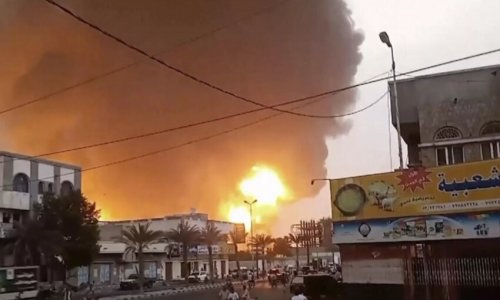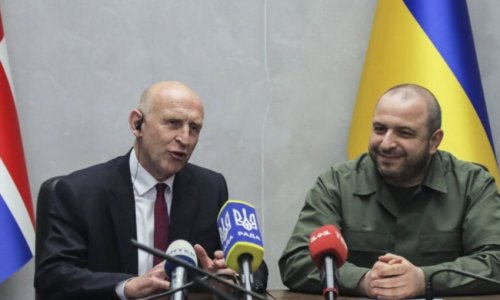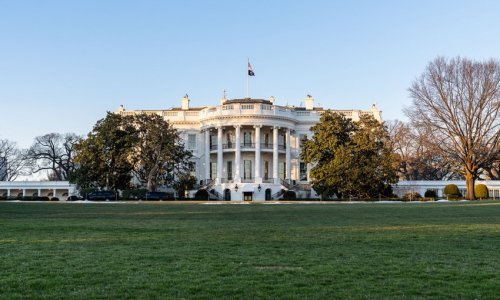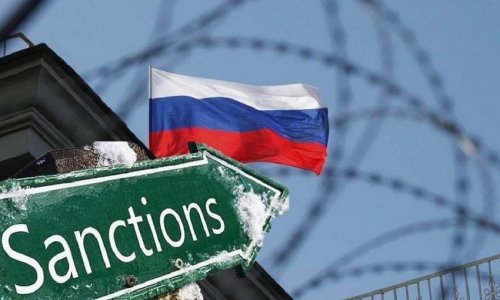Over the last month, the world's media has been awash with gruesome images of barbarism - pulled into sharp focus in recent days with the barrage of horrific videos and hate-filled messages pouring onto the internet from Sunni militants in Iraq.But it is far from restricted to that country alone. In just the last few days:Footage has emerged showing armed militant children as young as eight watching as an Iraqi prisoner is executed by ISIS, while another shows a captured Iraqi police officer being beheaded;At least five people have died in an attack on Kenya's coast just days after Al Qaeda-inspired terror group Al Shabaab kills 60 in twin massacres;Islamist militants Boko Haram are feared to have snatched 90 villagers in the same area of Nigeria where they seized nearly 300 Christian schoolgirls two months ago;A human rights group has warned that revenge attacks between Christian and Islamic militia in the Central African Republic risk creating conditions for a genocide reminiscent of Bosnia in the 1990s.Just last night, an explosion in a Nigerian shopping mall killed at least 21 people and injured 17 more as the nation prepared to watch its football team play Argentina in the World CupAlso yesterday, a suicide bomber killed himself and wounded several security officers at a hotel in Raouche in Beirut, close to the Saudi Arabian embassyAnother form of religious extremism has also gained widespread attention and subsequent outrage in Sudan, where a mother was handed the death sentence for marrying a Christian and was forced to give birth in shackles in prison.Mariam Yehya Ibrahim was released after an international outcry, but yesterday was re-arrested and charged with fraud as she tried to leave the country with her American husband, Daniel Wani, and their two children.The Sudanese authorities claim she failed to use her Muslim name on her travel documents.Just tonight, an explosion in a Nigerian shopping mall killed at least 21 people and injured 17 more as the nation prepared to watch its football team play Argentina in the World Cup.Witnesses said the blast - just an hour before tonight's match - left body parts scattered around the Emab Plaza in an upmarket district of Abuja.No one has yet claimed responsibility but the attack bears the hallmarks of Boko Haram extremists.At the same time, firefighters were tackling a blaze at a hotel in Raouche, western Beirut, after a suicide bomber killed himself and wounded several security officers, close to the Saudi Arabian embassy.Also yesterday, the highest court in Malaysia upheld a ban on Catholics using the word Allah to refer to their own god in what some experts fear is the latest step in a creeping Islamisation of the country.In Libya, voters were heading to the polls for parliamentary elections which they hope will bring in a government that can clamp down on violence at the hands of a patchwork of militias, including Islamic extremists, that continues to grip the country since the ouster of Muammar Gaddafi.Meanwhile, the lightning insurgency by Sunni militants ISIS threatens to overthrow the Shia-led Iraqi government and even break up the entire country as it seeks to create an Islamic state.Andreas Krieg, a Middle East security analyst at King's College London in Qatar, said he had noticed a rise in extremism in recent weeks and months, but said Islam wasn't to blame.He told MailOnline: 'All the empirical evidence shows that it is on the rise. You're seeing it in all the headlines, then you're looking at Iraq, you're looking at Syria, you're looking at Nigeria.'But in all three cases this has nothing to do with Islam. I think people in the West may think it is because they feel alienated by Islam. There is a lot of Islamaphobia.'Mr Krieg said more and more communities - often disillusioned by austerity or other grievances - have turned to religious groups as an alternative to secular regimes in recent years.He said: 'When communities become disenfranchised - and lot of them are muslim - they use Islam to further their particular cause.'They adhere to a radical interpretation of Islam, but it has nothing to do with the religion.'ISIS, in particular, appear to relish their growing publicity, increasingly courting online platforms such as Twitter and Facebook to promote their hate-filled agendas of murder and oppression.Professor Lee Marsden, international terrorism expert and head of East Anglia University's School of Political, Social and International Studies, said: 'Images of brutality perpetrated by these terrorist groups are being circulated around the world on an unprecedented scale.'While the levels of brutality seen here by ISIS and al-Shabaab are no different from what we have seen them do before, the way they are publicising their acts of terror is wholly new.'Ongoing civil war in Syria adds further instability to the fragile Middle East.In nearby Afghanistan, Taliban insurgents hellbent on destroying the first peaceful transfer of authority, ordered voters not to participate in the weekend's general election. And in further blow to the global fight against terrorism, Nigeria's former president, Olusegun Obasanjo, said the 200 schoolgirls taken snatched from the classrooms in the village of Chibok by Bokok Haram in northeast Nigeria in April may never return home.Boko Haram, which wants to set up an Islamist caliphate in Africa's largest economy, has fought back against an army offensive and killed thousands in bomb and gun attacks, striking as far afield as the central city of Jos and the capital Abuja.‘I believe that some of them will never return. We will still be hearing about them many years from now,’ Obasanjo told the BBC's Hausa-language radio service last week. ‘If you get all of them back, I will consider it a near-miracle...'(dailymail.co.uk)Bakudaily.az
How new era of Islamic fundamentalism is spreading fear and chaos - VIDEO
World
19:30 | 27.06.2014
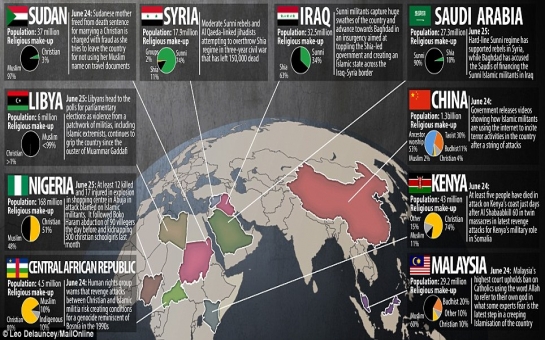
How new era of Islamic fundamentalism is spreading fear and chaos - VIDEO
From a beheading in Iraq to the hard-line repression of religious freedoms in Sudan, a string of extremist acts in recent weeks have raised the worrying spectre of a new era of Islamic fundamentalism spreading across the world.
Follow us !


